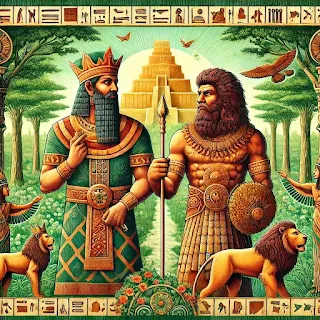Exploring the Epic of Gilgamesh: Humanity's First Great Story
The Epic of Gilgamesh holds a special place in the history of storytelling. Often considered the world's oldest piece of epic literature, this ancient Mesopotamian narrative predates Homer’s Iliad and Odyssey by over a thousand years. Its origins can be traced back to around 2100 BCE, inscribed on clay tablets in cuneiform script. Despite its age, the themes and questions posed by this epic remain profoundly relevant to modern readers.
 |
| Tablet XI or flood tablet of the epic of Gilgamesh. British Museum |
A Brief Overview of the Epic
The Epic of Gilgamesh centers around its titular hero, Gilgamesh, a historical king of Uruk, a city-state in ancient Sumer. The story unfolds in a series of episodes chronicling his transformation from a tyrannical ruler to a wise and compassionate leader. The narrative’s major arcs include his friendship with the wild man Enkidu, their heroic exploits, and Gilgamesh’s poignant quest for immortality.
Gilgamesh and Enkidu: A Tale of Friendship
At the heart of the epic lies the relationship between Gilgamesh and Enkidu. Initially created by the gods to curb Gilgamesh’s oppressive rule, Enkidu begins as a wild and untamed figure. Their eventual friendship, forged through a battle, serves as a transformative experience for both characters. Enkidu’s untamed spirit humanizes Gilgamesh, while the king’s strength and charisma refine Enkidu.
Their bond underscores universal themes of companionship, loyalty, and the human need for connection. When Enkidu dies as punishment for defying the gods, Gilgamesh is devastated. This event becomes the catalyst for the epic’s most poignant exploration: the quest for eternal life.
 |
| Enkidu, Gilgamesh's friend |
The Search for Immortality
Haunted by the loss of Enkidu and the looming reality of his own mortality, Gilgamesh embarks on a journey to uncover the secret of eternal life. This quest leads him to Utnapishtim, a figure reminiscent of Noah in the Bible, who survived a great flood and was granted immortality by the gods.
Through his encounters, Gilgamesh learns a humbling truth: immortality is reserved for the gods. Human beings, bound by the inevitability of death, must instead seek meaning in their earthly lives. This realization marks the climax of Gilgamesh’s character arc, as he returns to Uruk with a newfound appreciation for his responsibilities as a leader and the legacy he can leave behind.
Timeless Themes in a Timeless Epic
The Epic of Gilgamesh resonates deeply with modern audiences because it grapples with universal human concerns:
Mortality and the Human Condition: Gilgamesh’s quest for eternal life mirrors our own struggles with the fear of death and the desire for significance.
Friendship and Loss: The bond between Gilgamesh and Enkidu highlights the transformative power of relationships and the pain of losing loved ones.
Legacy and Leadership: Gilgamesh’s eventual realization that his legacy lies in his accomplishments and the prosperity of his city offers a powerful commentary on leadership and responsibility.
Cultural and Historical Significance
Beyond its literary value, the Epic of Gilgamesh provides a window into the culture, religion, and values of ancient Mesopotamia. The epic’s portrayal of gods, its depiction of daily life, and its philosophical musings reveal much about how early civilizations viewed their world and their place within it.
Moreover, the parallels between the Epic of Gilgamesh and later texts, such as the Bible, suggest its influence on subsequent literature and religious thought. The flood narrative, for instance, bears striking similarities to the story of Noah’s Ark, indicating shared mythological traditions in the ancient Near East.
Why the Epic Still Matters
The Epic of Gilgamesh endures not just as a historical artifact but as a vibrant piece of storytelling. Its exploration of what it means to live a meaningful life continues to inspire readers across millennia. In Gilgamesh, we see reflections of ourselves—our fears, our aspirations, and our relentless pursuit of understanding in an unpredictable world.
As you delve into this ancient text, you’ll find that the questions it asks remain as relevant today as they were nearly 4,000 years ago. The Epic of Gilgamesh is not merely a relic of the past; it is a testament to the enduring power of stories to connect us across time and culture.




.webp)
No comments:
Post a Comment
Politely express your views whiles respecting and tolerating others' views. All comments are screened